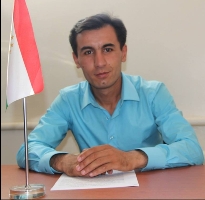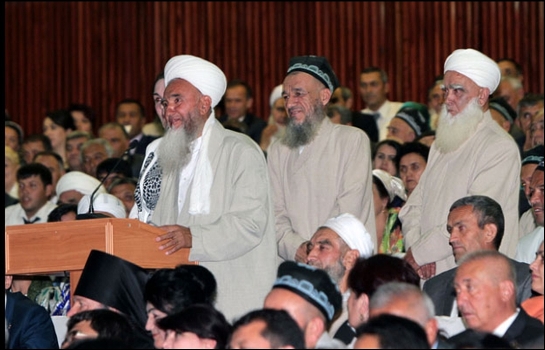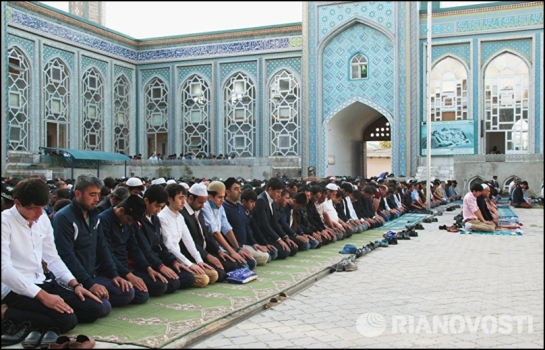Religious Rights and Freedoms in the Republic of Tajikistan

DUSHANBE, 20.09.2017. /NIAT “Khovar”/. It is becoming increasingly commonplace for some countries’ media sources to publish biased articles about alleged restriction of religious freedoms of the people in the Republic of Tajikistan having no basis behind it.
After gaining its independence in the beginning of the 90s the Republic of Tajikistan has started to create a democratic and constitutional society having observance of rights and freedoms of people as a top priority. And public right to freedom of thought, conscience, religion and belief was particularly one of the main courses of this process. During this period the ideological, political, and structural platform of the state’s attitude toward religion has been completely changed. Today, the state policy of the Republic of Tajikistan in the field of freedom of conscience and religious associations is carried out in compliance with constitutional principles of the civil society, based on political and ideological pluralism in the relations between the state and religious organizations in the secular society.
According to the legislation of Tajikistan, the state recognizes, observes and protects human and civil rights and freedoms regardless of nationality, race, gender, language, religion, political views, social status, education, property-related status or other circumstance.
To this end, there were established the legal basis and regulatory framework for protection of human rights and freedoms, including freedom of conscience and belief. Presently, along with the Constitution of the Republic of Tajikistan issues related to human rights to freedom of conscience and freedom of religion, relations between the state and religious associations, as well as legal status of religious associations are regulated by the Law “On Freedom of Conscience and Religious Associations”, the Law “On Regulation of Traditions, Celebrations, and Ceremonies in the Republic of Tajikistan”, and the Law “On the Responsibility of Parents for Raising and Educating Their Children” of the Republic of Tajikistan.
In this regard it should be emphasized that the country’s legislation complies with fundamental principles of the Universal Declaration of Human Rights (1948), International Covenant on Economic, Social and Cultural Rights (1966), International Covenant on Civil and Political Rights (1966) and its Optional Protocol (1966), Convention on the Rights of the Child (1989), which have been recognized by the Republic of Tajikistan.
 During the independence period of the Republic of Tajikistan with the purpose to coordinate the processes of religious life, as well as to conduct researches on issues related to the religion, particularly, on Islamic studies, there were established the Committee on Religious Affairs, Regulation of National Traditions, Celebrations and Ceremonies under the Government of the Republic of Tajikistan, Center for Islamic Studies under the President of the Republic of Tajikistan, Council of Ulema of the Islamic Center of Tajikistan, Islamic Institute of Tajikistan named after Imam A’zam Abuhanifa Nu’mon ibn Sobit and high schools of religious education in the country.
During the independence period of the Republic of Tajikistan with the purpose to coordinate the processes of religious life, as well as to conduct researches on issues related to the religion, particularly, on Islamic studies, there were established the Committee on Religious Affairs, Regulation of National Traditions, Celebrations and Ceremonies under the Government of the Republic of Tajikistan, Center for Islamic Studies under the President of the Republic of Tajikistan, Council of Ulema of the Islamic Center of Tajikistan, Islamic Institute of Tajikistan named after Imam A’zam Abuhanifa Nu’mon ibn Sobit and high schools of religious education in the country.
At the same time, with a view to increase the religious awareness among the population, the Government of the Republic of Tajikistan has undertaken activities for publishing more books on academic study of religion and religious-educational papers. The Holy Quran has been translated into Tajik language and hadiths have been published also. Another important scientific and religious sources such as “The History of Tabari”, “The Alchemy of Happiness” and “The Revival of the Religious Sciences” by Al-Ghazali, “Masnavi”-i Mavlavi, “Ravzatu-s-safo” by Mirkhond, “Sahih al-Bukhari”, other hadiths, tractates of Imam A’zam Abuhanifa, and works of numerous classic poets related to the issues of religious culture have been published and introduced to the people. Festive celebration of Imam A’zam, founder of the Hanafi School, in 2009 once again reaffirmed the support of the country’s senior leaders and people of Tajikistan for traditional religious values and sanctuaries.
Thus, in order to create favorable conditions for protection of religious rights and freedoms of the people within the country, a large number of religious associations (mosques) and religious schools have been built, and holy sites have been refurbished. In summation, there are no legal limitations in the country for fulfillment of the Islam’s dogmas and injunctions. During the independence period of the Republic of Tajikistan there have been founded and registered more than 4,000 religious associations (in the early independence years there were only 17 of them), including 70 non-Muslim religious associations), where religious followers perform their worship. According to the applied calculations, there is one mosque for every 1,800 people in Tajikistan (for reference, this indicator is higher than in many developed countries). And in such a case the process of registration of the new religious associations is still going on. In addition, prayer can be freely performed at home and there are no legal provisions for limitation of these rights and freedoms of religious followers. Today, there is a tremendous mosque holding 115 thousands of worshippers for simultaneous pray of Namaz that is being built in the center of Dushanbe.
During this period, all the favorable conditions have been fully provided for pilgrims so they can perform Hajj and Umrah. According to the prescribed allowance there are more than 6,000 citizens of the country who perform Hajj annually. Altogether, over the years of independence, more than 200,000 citizens of Tajikistan have performed pilgrimage to the House of Allah.
 Such Muslim holidays as “Eid al Fitr” and “Eid al Adha” also differ comparing to the years preceding the independence, as they are now officially recognized within the country and are widely celebrated among other state holidays.
Such Muslim holidays as “Eid al Fitr” and “Eid al Adha” also differ comparing to the years preceding the independence, as they are now officially recognized within the country and are widely celebrated among other state holidays.
Every year there is organized a Holy Quran reciting competition in Tajikistan. The Quran reciters also participate in international competitions. The Muslim population of the country freely venerates traditions of Islamic culture within the home environment.
It should be emphasized that worshippers of the Holy Spirit of Islam within the country’s legal framework may have the preference of their mazhab wills in the Tajik society. Today, the religious space in the country is free and well-balanced.
On the other hand, the Republic of Tajikistan became a member of the Organization of Islamic Cooperation in 1992, having established a constructive relationship with Islamic countries. In 2010, Dushanbe has been declared as the “Capital of Islamic Culture”. Council of Ulema of the Islamic Center of Tajikistan has also established a good level of cooperation with authorities of the same character in majority of the Muslim countries.
Therefore, allegations of the mass media about declaring the Islamic Renaissance Revival Party of Tajikistan as a terrorist organization and prohibiting its activity, as well as about detaining and torturing theparty’s members, shaving the Muslim men’s beards and taking off the women’s headscarves, prohibiting the youth’s visits to mosques, limiting age for performing of Hajj are biased and lopsided.
In fact, the Islamic Renaissance Revival Party of Tajikistan was the only Islamic party in the post-Soviet space which was considered as a basis for national reconciliation within the Tajik society. It should be noted that the Party was a primal cause which is responsible for the civil war in Tajikistan at the beginning of the nineties of the last century, but in order to prevent continuation of the bloodshed in the country and as a result of the General Agreement on the Establishment of Peace and National Accord (1997) it got a chance to carry out its activity as a political party in the territory of the Republic of Tajikistan. Before the elections in 2015 the Party has had its representatives in the Parliament of the country. But after failing in parliamentary elections in 2015, on 4 of September that same year the Islamic Renaissance Revival Party attempted a military coup which resulted in deaths of several law enforcement officers and citizens of Tajikistan. Only with a view to ensure peace and stability in the country and solely after confirmation of the direct relations between the party leadership and convicts, there had been taken the legitimate measures for closing this party down. Members of the Party have been also involved in organization of criminal groups, public appeals to overthrow the constitutional system of Tajikistan, terrorist acts and propaganda of extremist ideas in order to destabilize the political situation within the country. Furthermore, some particular members of the Party have been apprehended in connection with acts of terrorism and other crimes.
It is important to note that the Party’s leadership was the main cause of civil war in 1992-1997 in Tajikistan (this war left more than 100 thousands citizens dead, inflicting the financial damage which is estimated to cost billions of US dollars for the newly independent state), and in 2015 they took their arms to achieve the same goals. Declaration of the Islamic Renaissance Revival Party of Tajikistan as an extremist and terrorist one, and its outlawing took place on the basis of the provided evidences by the judicial authorities, and this fact, by no means, affects or restricts religious rights and freedoms of the country’s population. Because according to constitution of the country every citizen irrespective of his/her nationality, race, sex and religious beliefs are equally responsible before the law.
Regulation of participation of minors in some types of religious associations based on the national legislationis not contrary to the international legal norms, quite the opposite, it ensures the children’s rights. The legislation binds minors engaging in activities of religious associations and getting their religious education to their parents’ position, which is reasonable considering a child’s need for guidance upon reaching the age of majority.
Until the independence period of the Republic of Tajikistan, people have faced the serious problems for performing Hajj. During 70 years of rule by the former Soviet Union only 31 persons have done it. And today there is a greater demand from that age bracket of the society – people, who have not had the opportunity to perform pilgrimage and fulfil their sacred trust. So, age limit for performing Hajj comes only in response to the need to create favorable conditions for the elderly people in the given circumstances.
As for the prohibition of wearing a headscarf or hijab, or sprouting a beard, which are considered as disadvantages of the society by majority of media sources, it should be mentioned that in fact, there are no legal limitations in this regard. Taking into account that the Republic of Tajikistan is a national state, with a view to protect national values it is recommended to wear national dress and observe religious foundations due to mazhab based on national traditions.
On the other hand it should be reminded that the Government of the Republic of Tajikistan has at the same time provided other rights, freedoms and fundamental interests of its citizens, including ensuring peace and stability, sustainable economic development, elimination of poverty, favorable social processes in the society, providing education to youth and etc. Tajikistan stands for the balance in the social processes of the society.
The country’s civil war in the early 90s, military coup attempts of the extremist and terrorist groups in 2015, expansion of the extremist ideology, joining of youth to the extremist and terrorist groups and movements, contemporary world’s challenges and other factors in some cases oblige Tajikistan to conduct awareness-raising activities for regulation of certain pillars in the society based on the country’s national legislation and national traditions. Today, there are more than 1,000 young Tajiks who have joined extremist and terrorist movements outside the country. In the absence of preventive measures, this situation may affect the religious unity and people’s faith, and thus have an influence on stability and security of the country and the region as a whole.
Prevention of the extremist ideas and at the same time protection of national customs and traditions in no case implies limitation of religious freedom, and with confidence can say that the Republic of Tajikistan will further take practical steps for ensuring rights and freedoms of the country’s population within its national legislation and international obligations.
Nomvar Qurbanov
Associate Professor of the National University of Tajikistan
and the member of the union of journalists










 Countdown Begins: Global Firms Line up to Participate in CIIE 2024
Countdown Begins: Global Firms Line up to Participate in CIIE 2024













